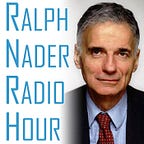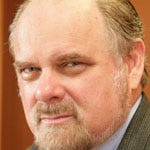Ralph and Washington Post columnist, E.J. Dionne debate the distinction between “Progressive” and “Liberal,” and Original Nader’s Raider, Robert Fellmeth tells us why he thinks speech on the Internet should not be anonymous.
E. J. Dionne writes about politics in a twice-weekly column in the Washington Post and on the Post Partisan blog. He is also a senior fellow in governance Studies at the Brookings Institution (
https://www.brookings.edu/
), a government professor at Georgetown University and a frequent guest on NPR, ABC’s This Week and MSNBC. He is the author of seven books, the latest of which is “One Nation Under Trump: A Guide For the Perplexed, the Disillusioned, the Desperate, and the Not Yet Deported.”
“I don’t see the same sharp distinctions between the center/left and the left right now in the U.S. or – as you put it – between liberals and progressives. For example, take the issue of universal healthcare. Some of my progressive friends say that only single-payer is the way to go. I have nothing against single-payer. It’s a system that works in many countries. I also think that universal coverage that would essentially treat the health system as a public utility, which is kind of what you do in Germany or the Netherlands – that that would work as well. I think we should have a healthy argument about what’s going to work better, not some argument that says only single-payer is the way to achieve universal coverage.”
E.J. Dionne
After helping Ralph investigate the Federal Trade Commission as one of those original “Nader’s Raiders,” Robert Fellmeth became an attorney for the Center for the Study of Responsive Law, Ralph’s office in DC. In 1980, as a University of San Diego Law School faculty member, he founded that school’s Center for Public Interest Law. He is also the founder of the Children’s Advocacy Institute, one of the nation’s premiere academic, research, and advocacy organizations working to improve the lives of all children and youth, with special emphasis on reforming the child protection and foster care systems and improving outcomes for youth aging out of foster care.
“People talk about the right to speak and free speech on the utterance side. But that’s only one part of it. The other part of it is the right of the audience to weigh the credibility of the speaker. Who is that? What are their biases? What’s their expertise? The first amendment is not just defending the right of people to bleat, to make noise. It has a purpose in terms of ascertaining the truth, and developing the points of view, and educating people. And the identity of the speaker is critical to that function.”
Robert Fellmeth














